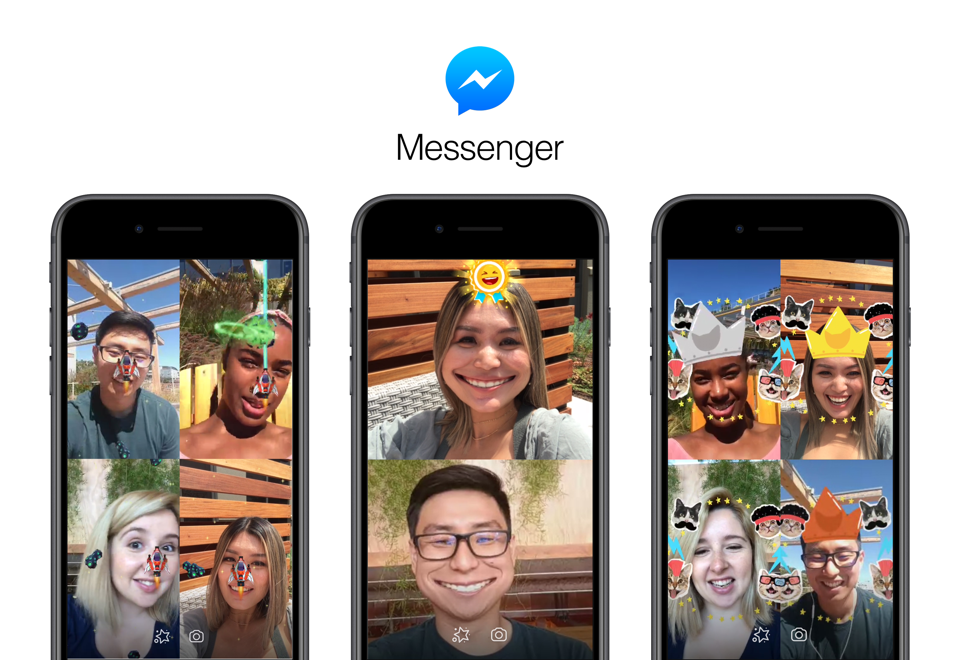
Facebook has launched two augmented reality (AR) games on its Messenger service, further indication that the social media giant is backing the technology to become a valuable tool in its advertising arsenal.
Augmented reality, which blends digital elements with real life, has become increasingly popular with the proliferation of the smartphone.
And since acquiring virtual reality (VR) startup Oculus VR for $2bn, CEO Mark Zuckerberg has made mixed reality one of the company’s top priorities.
The Facebook Messenger AR games, which can be accessed as of today in video calls on the Facebook Messenger app, are the latest part of that plan.
One game, ‘Don’t Smile’, challenges users to keep a straight face, with the first to crack a smile seeing their face morph into a big goofy grin.
The other, ‘Asteroids Attack’, sees a spaceship balanced on the participants’ nose. Users must move their head to steer the spaceship away from asteroids that fly across the screen.
How well do you really know your competitors?
Access the most comprehensive Company Profiles on the market, powered by GlobalData. Save hours of research. Gain competitive edge.

Thank you!
Your download email will arrive shortly
Not ready to buy yet? Download a free sample
We are confident about the unique quality of our Company Profiles. However, we want you to make the most beneficial decision for your business, so we offer a free sample that you can download by submitting the below form
By GlobalDataIt is not Facebook’s first foray into AR, with the company introducing a catalogue of AR filters to its video chat last summer.
Straight out of Snapchat
When Facebook introduced these AR filters, critics accused the company of copying Snapchat, the social media app that arguably popularised AR filters.
Snapchat would also be justified to feel aggrieved with Facebook Messenger’s AR games, having launched its own AR games back in April called Snappables.
It follows a long history of Facebook borrowing from Snapchat. Its Messenger Day feature, which allows users to post disappearing stories – the main premise of Snapchat – also drew criticism.
Facebook-owned Instagram and WhatsApp have also adopted the disappearing stories tool.
When criticised in 2017 for copying Snapchat, Zuckerberg, a man yet to be troubled by the explosive Cambridge Analytica scandal, replied: “I guess I’m not that worried about that.”
Snapchat has struggled to cope with this competition. Yesterday, it announced its first ever drop in daily users – three million less daily users compared to the previous quarter – in its second quarter results.
However, Snap’s shareholders will take solace in the company’s 44% increase in revenue.
Although its losses narrowed, the company has long struggled to make money. One of its advertising revenue streams is through its sponsored lenses and filters, which allows businesses to create bespoke AR filters for a campaign, event or a geolocation.
These have taken the form of film promotions, such as the latest Alien film, or brands such as Cadbury’s, which saw users’ eyes replaced with two crème eggs.
With Facebook’s history of replicating Snapchat’s features, it would come as no surprise if the company decided to pursue a similar business model when it comes to AR.
Facebook Messenger AR games: Another revenue stream?
Facebook has made no announcement as to whether it plans to monetise its AR features in the future. That should come as no surprise. The Zuckerburg model has always been to provide social value first, then, once users are hooked, begin the process of monetisation.
In 2012, for example, Zuckerberg introduced a raft of initiatives for the platform to make money – eight years after founding Facebook. Almost all of these were exclusively through advertising.
Zuckerberg’s previous comments also lend weight this idea. When quizzed by analysts after his purchase of Oculus, he outlined a future where people were connected in virtual and augmented realities.
“We’re not going to try to make a profit off the devices long term. We view this as a software and services thing,” he said.
“Where if we can make it so that this becomes a network where people can be communicating and buying things and virtual goods, and there might be advertising in the world, but we need to figure that out down the line.”
It is not a difficult stretch to imagine Facebook opening up its AR platform to advertisers. In fact, it already has.
During the seventh season of Game of Thrones, a HBO sponsored AR filter that transformed users into series arch-villain the Night King was used by more than a million users.
AR messenger bots have also been used by brands such as Sephora, which allows customers to virtually try on an eyeliner or lipstick.
With Facebook’s 1.47 billion daily users dwarfing Snapchat’s 188 million, the potential for extra revenue from an AR market predicted to be worth almost $200bn by 2025, the reward could be lucrative.
Facebook plans to roll out more games in the coming weeks and months, with games such as Beach Bump and Kitten Kraze, hinting that this is just the beginning of Facebook’s AR strategy.






